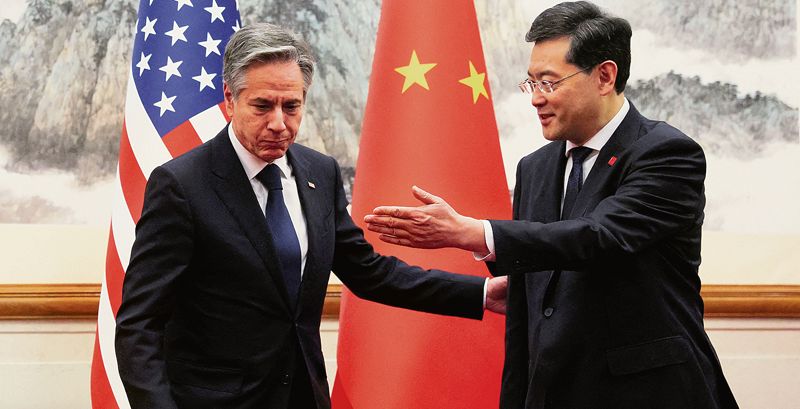
Cautious move: The US-China relations are currently at an all-time low. Reuters
Jayadeva Ranade
President, Centre for China Analysis and Strategy
China’s tightly controlled official media, in sharp contrast to the Western media, afforded sparse coverage to US Secretary of State Blinken’s visit to China on June 18-19. Successive articles in China’s media also cautioned that the US was advertising a so-called desire to improve ties when, in reality, it wanted to contain China.
The special, warm welcome accorded to Indian Prime Minister Modi and the speeches during his visit would have heightened Chinese suspicions. A closer look at the respective official accounts of Blinken's meetings in Beijing also reveals differences in content and tone, suggesting that the outcomes of similar future contacts are likely to be at variance with popular expectations.
During his two-day halt in Beijing, Blinken had a five-and-a-half hour meeting on June 18 with Chinese State Councillor and Foreign Minister Qin Gang at the Diaoyutai State Guest House. This was followed by a 35-minute meeting with Wang Yi, seniormost Chinese diplomat who is currently a Politburo member and Director of the Central Committee Foreign Affairs Office. Finally, giving barely 45 minutes’ notice — reminiscent of the style of the late Chairman Mao’s style of functioning — Blinken was informed that he would be received by Chinese President Xi Jinping.
Official statements released by both sides after Blinken’s meeting with Xi Jinping indicated that the latter appeared satisfied with the visit, describing it as ‘substantive’ and ‘constructive’.
While Xi Jinping has met all earlier visiting US Secretaries of State since Henry Kissinger, given that the US-China relations are currently at an all-time low, his meeting with Blinken sent out a couple of messages. These were tailored equally for the foreign and domestic audiences.
To the foreign audience, Xi Jinping sought to convey that it was the US that had damaged the bilateral relationship and was trying to contain China’s growth with sanctions on hi-tech sales and exports and attempts to create an alternative ‘trusted’ secure supply chain.
By raising the Taiwan issue, the US was attempting to pressure it. Chinese Foreign Minister Qin Gang pointed out that “the Taiwan question is at the core of China’s interests, it is the most significant issue in China-US relations, and it is also the most prominent risk.”
Politburo member Wang Yi was more direct in his remarks. Stating that the priority was to stabilise the China-US relations, he emphasised that the "root cause of the current downturn in China-US relations lies in the US side’s erroneous understanding of China, which has resulted in misguided policies toward China.” He said the two countries need to “work together to find the right way for China and the US to coexist in the New Era” — a phrase that many Chinese interpret as China placing itself on a par with the US. Wang Yi insisted that the US should “stop hyping up the ‘China threat theory’, lift its illegal unilateral sanctions against China, abandon the suppression of China’s technological development and refrain from interfering in China’s internal affairs at will.”
Wang Yi expanded at length on the Taiwan question. He emphasised that “safeguarding national unity is always the core of China’s core interests, and it is related to the destiny of all Chinese people and the unwavering historical mission of the Communist Party of China.” Laying down the ‘red line’, he asserted: “On this issue, China has no room for any compromise or concession.”
The message to the domestic audience in China was similarly clear. There has been criticism inside China since the 19th Party Congress in 2017 of Xi Jinping's handling of the policy towards the US. In recent months, official reports have admitted high graduate unemployment, rising unemployment in rural and other sectors and the closure of tens of thousands of businesses.
Articles recommending the need for an improvement in the China-US bilateral ties have been published by China's controlled official media. Improved Sino-US relations are crucial for the revival of China's export-dependent economy — China’s exports to the US dropped by 17 per cent last year.
By meeting Blinken, Xi Jinping indicated that he favoured an improvement in relations, thereby addressing this domestic criticism. At the same time, he conveyed that there would be no compromise or concessions. He reiterated the ‘red line’ on the Taiwan issue. This message was further underscored by China’s blunt refusal to establish a crisis hotline between the two militaries.
Though the Chinese media, including major outlets like the People’s Daily, the Guangming Daily and the state-owned China Central Television, gave low-key coverage to the visit, it was closely watched by the Chinese. A number of comments were posted on China’s social media platforms, with almost equal numbers expressing optimism and negative views. Chinese experts are similarly divided.
Blinken’s visit appeared to be an attempt to reduce tensions but publicly, at least, it offered no substantive proposals.
Similarly, though Xi Jinping meeting Blinken is being interpreted as a positive sign, it was not accompanied by any move to ease the strained relationship. On the contrary, Beijing sought to bypass US curbs on hi-tech and Xi Jinping invited Bill Gates and discussed hi-tech collaboration in AI on television!
China also placed the entire blame for the deterioration in relations on the US. Beijing, additionally, urged the US to treat it on an equal footing. Chinese leaders, including Xi Jinping, are convinced that the US is intent on containing China and bringing about the downfall of the Chinese Communist Party (CCP) and this will complicate relations.
The special welcome accorded to India’s Prime Minister Modi and major bilateral agreements signed will reinforce Chinese suspicions.
Join Whatsapp Channel of The Tribune for latest updates.




























